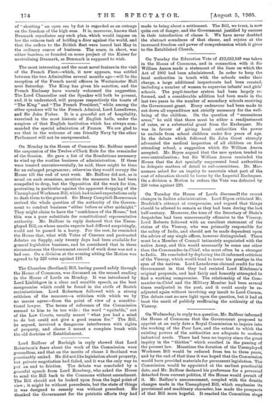On Tuesday the House of Lords discussed, the recent changes
in Indian administration. Lord Ripon criticised Mr. Brodrick's attempt at compromise, and argued that things should be allowed to remain as they had been during the last half-century. Moreover, the tone of the Secretary of State's despatches had been unnecessarily offensive to the Viceroy. Lord Roberts followed with an excellent statement of tha • status of the Viceroy, who was primarily responsible for the safety of India, and should not be made dependent upon • the advice of any single officer, however distinguished. There must be a Member of Council intimately acquainted with thel native Army, and this would necessarily be some one other than the Commander-in-Chief, who must often be a stranger to India. He concluded by deploring the ill-informed criticism' of the Viceroy, which would tend to lower his prestige in the eyes of the natives. Lord Lansdowne claimed credit for the Government in that they had resisted Lord Kitchener's original proposals, and had fairly and honestly attempted to find a working compromise. The relationship of the Com- mander-in-Chief and the Military Member had been several times readjusted in the past, and it could surely be re adjusted again without involving any insult to Lord Curzon, The debate cast no new light upon the question, but it had at least the merit of publicly reaffirming the authority of the Viceroy.






































 Previous page
Previous page